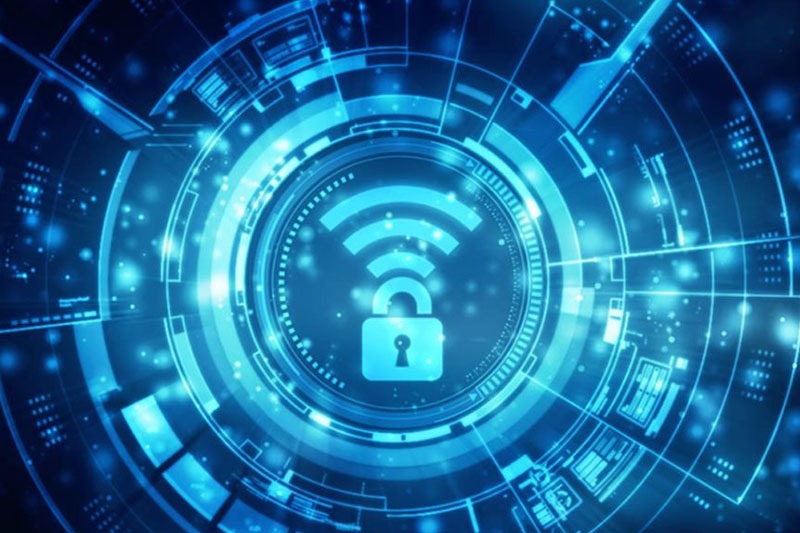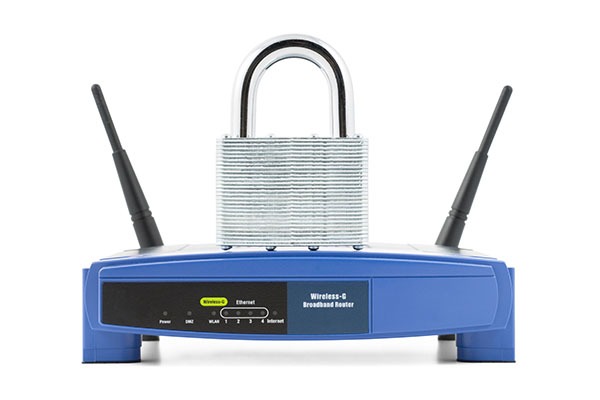Implementing a wireless network to give your teams Wi-Fi access has become crucial for businesses looking to increase productivity. A business network acts as a separate network from those a guest can access. Protecting data on a wireless network is often overlooked by small businesses at a time when hackers have started to focus more on local business data ransoms. Many small business owners underestimate how much information a hacker can gain from the smallest pieces of data. It is important to secure business WiFi to prevent cyberattacks. You can keep your business Wi-Fi network and private data secure from data breaches with the right security measures and a few tips from our team of network security experts.

Immediately Change Default Wi-Fi Network Credentials
Whether it’s for a guest network or a set of private networks, wireless routers come with generic login details located on the device itself. These credentials give anyone access to alter the router’s settings or disable the router’s firewall entirely. Even if the default settings seem to use a unique password, most of the login information is available on the internet.
Create a unique username and password with random phrases and numbers for maximum security. Avoid any username or password that uses information unique to the admin, such as their name, date of birth or anniversary. Hackers can socially engineer this information directly from your employees, which leaves your wireless network unprotected.
Share your new password only with relevant personnel to minimize the number of users accessing the private Wi-Fi network. We recommend changing the password every quarter or whenever employees who know the credentials leave the company. The name, or SSID, is how the router appears when devices search for an available Wi-Fi network and only needs to be changed once upon initial installation.
Keep Router Access Secure
Even the best-prepared Wi-Fi networks can be rendered defenseless if hackers are able to physically access the main router. Ensure that only IT or cybersecurity teams have access to a locked office that stores your company’s network devices. Badge scanners and biometric screening tools are sophisticated options that are more difficult for hackers to circumvent.
Wireless security boasts another physical risk through the inclusion of WPS, or Wi-Fi Protected Setup. The simple process allows devices to connect to a secure network without the need for a password. All it takes is for a user to request a Wi-Fi connection and then press the WPS button to gain total access. Restricting physical access points or disabling WPS is recommended.
To secure Wi-Fi protected access points, we encourage you to verify your security settings. Older technology uses an outdated and easily breached protocol called Wired Equivalent Privacy, also known as WEP. Modern encryption protocols use Wi-Fi Protected Access, or WPA, to secure your Wi-Fi. For routers that don’t support WPA, it’s suggested to check for firmware updates or external software that provides the functionality or to upgrade the router.

Separate Business and Guest Wireless Networks
Consider the fact that almost any wireless device can see and attempt to interact with wireless networks as long as they’re in range and the user has the required credentials. Today’s cyberattacks often use malicious programs to skim credentials or bypass login requirements entirely. Funnel guests and any non-business-related activity to guest networks to minimize exposure of your hidden company network name.
Wi-Fi networks also have a knack for creating temporary access points that linger even after they’re out of use. Rogue access points are users that are connected to the main network but haven’t been sanctioned by the admin. Frequently scan for unknown connections on both guest Wi-Fi and internal Wi-Fi.
Proactively stopping unauthorized guests from trying to connect takes multiple layers of network security. Firewalls help identify potentially dangerous programs and prevent users from accessing sensitive information or uploading malicious software. Default and third-party firewalls also increase the security of programs that share information online by limiting what can be sent with explicit permission.
Limit Wireless Network Connections With DHCP
DHCP stands for Dynamic Host Configuration Protocol and shows the IP address of a device after a successful connection. By default, the protocol has no limit and will continuously assign IP addresses until stopped. Limiting the DHCP gives you control over how many connections are active at any given time. Remove older devices to make room for new ones.
Networks that require tighter security can completely disable the DHCP and require manual sanctioning of a device before it can connect. This practice takes more time and labor to conduct, but it offers added security for classified or highly sensitive data. Remember to routinely verify connected devices when changes are made to the network and remove unauthorized listings.
DHCP servers can be used in Windows or Linux, with additional software available to make maintenance and device management simple. Creating a new DHCP server or adding DHCP service to an existing server can add much-needed security; just remember not to use the same password for new networks.
![]()
Work With Eire Systems to Secure Your Business Data
Small and medium-sized business owners understand the value behind their data. Even information that seems mundane can be useful for hackers trying to gain access to your network. The EIRE Systems team has experience working with businesses of all shapes and sizes to create bespoke network security solutions that scale with the company.
Take a moment to reach out to our IT security team and schedule a consultation today. We’ll work directly with your organization’s stakeholders and IT team to ensure all network and cyber-protection needs are met. Our solutions raise your networks up to today’s standards while implementing measures to future-proof them against potential attacks that use new methods.
About the Author: EIRE Systems
EIRE Systems is a leading independent provider of professional IT, AV and Access Security services to the financial, insurance, manufacturing, health care, retail, construction, hospitality, commercial real estate, legal, educational and multinational sectors in Japan and throughout the Asia Pacific region. EIRE Systems has expertise across a wide spectrum of Information Technologies, with a track record for successfully completing hundreds of assignments since its establishment in 1996.



